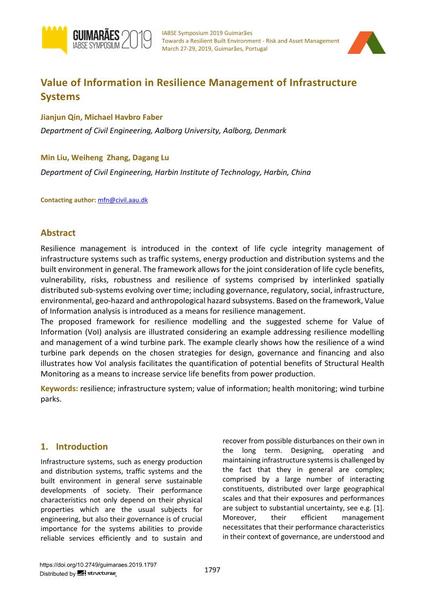Value of Information in Resilience Management of Infrastructure Systems

|
|
|||||||||||
Détails bibliographiques
| Auteur(s): |
Jianjun Qin
(Department of Civil Engineering, Aalborg University, Aalborg, Denmark)
Michael Havbro Faber (Department of Civil Engineering, Aalborg University, Aalborg, Denmark) Min Liu (Department of Civil Engineering, Harbin Institute of Technology, Harbin, China) Weiheng Zhang (Department of Civil Engineering, Harbin Institute of Technology, Harbin, China) Dagang Lu (Department of Civil Engineering, Harbin Institute of Technology, Harbin, China) |
||||
|---|---|---|---|---|---|
| Médium: | papier de conférence | ||||
| Langue(s): | anglais | ||||
| Conférence: | IABSE Symposium: Towards a Resilient Built Environment Risk and Asset Management, Guimarães, Portugal, 27-29 March 2019 | ||||
| Publié dans: | IABSE Symposium Guimarães 2019 | ||||
|
|||||
| Page(s): | 1797-1807 | ||||
| Nombre total de pages (du PDF): | 11 | ||||
| DOI: | 10.2749/guimaraes.2019.1797 | ||||
| Abstrait: |
Resilience management is introduced in the context of life cycle integrity management of infrastructure systems such as traffic systems, energy production and distribution systems and the built environment in general. The framework allows for the joint consideration of life cycle benefits, vulnerability, risks, robustness and resilience of systems comprised by interlinked spatially distributed sub-systems evolving over time; including governance, regulatory, social, infrastructure, environmental, geo-hazard and anthropological hazard subsystems. Based on the framework, Value of Information analysis is introduced as a means for resilience management. The proposed framework for resilience modelling and the suggested scheme for Value of Information (VoI) analysis are illustrated considering an example addressing resilience modelling and management of a wind turbine park. The example clearly shows how the resilience of a wind turbine park depends on the chosen strategies for design, governance and financing and also illustrates how VoI analysis facilitates the quantification of potential benefits of Structural Health Monitoring as a means to increase service life benefits from power production. |
||||
